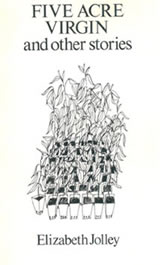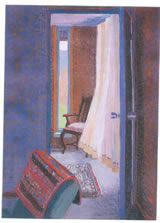

Illustration by Sue Grey-Smith,
first edition of Five Acre Virgin,
courtesy Fremantle Press
To receive two Premiers' prizes, the Age and the National Book Council awards, and the Miles Franklin in just a decade is the literary equivalent of having been dealt a poker hand of two high-value pairs and an ace, not unbeatable but surely a hand to feel good about.
Introduction by Barbara Milech
The following listing of awards, honours, grants and artworks associated with the work of Elizabeth Jolley has some forensic value for measuring the significance of her many achievements and for defining the oerall trajectory of her career as an Australian writer. For example, having written assiduously for decades in the UK with no more success than a children's story broadcast on the BBC in 1947 (when she was twenty-four), five years after migrating to Australia in 1959 she received an award for her short story "A Hedge of Rosemary" in 1966 and another for a draft of her novel Palomino in 1975.
In contrast to such beginnings of recognition as an Australian writer, less than two decades later, in the 1990s, she received eight significant literary awards: two from the Victorian branch of the Fellowship of Australian Writers (for Cabin Fever and The Orchard Thieves); two state prizes (the 1993 WA Premier's Book Award for Historical and Critical Studies and its Premier's Prize for Central Mischief); a professional-society prize (ASAL's 1991 Australian Literary Studies Gold Medal for Cabin Fever); and three national prizes (the 1993 Age Book of the Year Award for Fiction as well as its Book of the Year for The George's Wife, and the National Book Council's 1994 Banjo Award for the same book). Furthermore, she was given a career award from the Western Australian Branch of the Society of Women Writers in 1992 and received one of the inaugural 100 Australia's Living National Treasures Awards in 1997, as well as one of Western Australia's State Living Treasures Awards in 1998.
Her achievement is the more impressive when one notes the number of times her work was short listed for major prizes during the decade: Cabin Fever for the 1991 Banjo Award; The Georges' Wife for the Association for the Blind's Braille and Talking Book Library Award, and also for the 1994 Banjo Award; and Lovesong for the 1998 Miles Franklin Award. Still more, although described by the judges as "outstanding," The Georges' Wife controversially was disqualified from the 1994 Miles Franklin Award for being "insufficiently Australian."
Yet the 1980s was the decade of her greatest acclaim, whether reckoned by the number of awards she received or the nature of the organisations conferring them. In addition to its being the decade of her publishing ten books (nine novels and a short-story collection, not counting the re-publication of two 1970s collections in one volume), her work received remarkable recognition: four Fellowship of Australian Writers (Victoria) prizes (for her stories "Two Men Running" and "The Libation" and her novels Palomino and The Well), two professional-society prizes (the SPACLALS award for "Hep Duck and Hildegarde the Meat" and an AWGIE for her radio play "Two Men Running"), two state prizes (the 1983 Western Australian Week Literary Award [predecessor of the WA Premier's Book Award] for Prose Fiction for Mr Scobie's Riddle and the 1985 NSW Premier's Literary Award for Fiction for Milk and Honey); and five national prizes (the 1983 Age Book of the Year Award for Imaginative Writing and also for Book of the Year for Mr Scobie's Riddle, its 1988 prizes for Imaginative Writing and the Book of the Year for My Father's Moon and, then, in 1986, the prize of prizes, the Miles Franklin Award for The Well); and there was also an international award, the 1988 Canada/Australia Literary Prize.
To receive two Premiers' prizes, the Age and the National Book Council awards, and the Miles Franklin in just a decade is the literary equivalent of having been dealt a poker hand of two high-value pairs and an ace, not unbeatable but surely a hand to feel good about.

Painting by Evelyn Kotai
from Diary of a Weekend
Farmer,
courtesy Fremantle Press
Jolley's considerable record of awards and honours was not the result of luck but of exceptional writing and plain hard work, as suggested by the honours she garnered in the 1980s alone: her first of four honorary doctorates, an Order of Australia, a two-and-a-half-year Senior Fellowship from the Literature Board of the Australia Council, and an Australian Bicentennial Authority Award commissioning a novel (The Sugar Mother). Such recognition was synergistic with other elements of the writer's network, such as writers' festivals. When she went to the Adelaide Festival's Writers' Week in 1980, she met Caroline Lurie, who became her first literary agent. She then was invited, all-expenses-paid, to read at the 1983 Toronto Harbourfront International Festival of Artists. On her return, she was an invited guest to the 1984 Adelaide Festival's Writers' Week, this time as a major writer to read alongside Indian-born Salmon Rushdie and André Brink of South Africa.
Such a decade-by-decade summary of the ways in which Jolley's work found recognition is useful in one way, but, of course, arbitrary in another. Perhaps the best example of its being so is that it obscures the fact that the Vera trilogy (so called because the protagonist of all three novels is Vera Wright) spans two decades: My Father's Moon (1989) and Cabin Fever (1990) and The Georges' Wife (1993). The protagonist's name-Vera (a variant of Veronica) Wright-might recall Jolley's birth name, Monica Knight, but in any case the three books are highly autobiographical. Together they sustain a meditation on family, and together they won eight awards, something that suggests their special status in Jolley's oeuvre. Put differently, the high point of her career might well be regarded as straddling the late 1980s and the early 1990s when, in addition to the trilogy, Jolley also published her award-winning collection of essays Central Mischief in 1992 and her exceptional novella (which can be read as forming a coda to the trilogy) The Orchard Thieves in 1995.
The years 2000-2007 were a denouement. In 2000 there
were several awards: literarily, an audio book award for An Accommodating
Spouse; academically, an honorary doctorate from the University of
New South Wales; and, civically, awards from the Claremont Branch of the
Liberal Party (although she was not a Liberal), a Commonwealth Recognition
Award for Senior Australians, and a Centenary Medal which, as part of
the commemoration of 100 years of Federation, recognised those "who
had made a contribution to Australian society or government." She
entered the Alfred Carson Lodge in August 2002. Following her death on
13 February 2007, Curtin University inaugurated an undergraduate scholarship
in her name for a creative-writing student; on 30 August the Melbourne
Writers' Festival staged a tribute session in her honour and announced
the establishment of an annual Elizabeth Jolley Lecture; and the Western
Australian Symphony Orchestra dedicated its 16-17 November program at
the Perth Concert Hall to her, which included Johannes Brahms's Ein Deutches
Requiem, one of her favourite pieces of music, one played at her funeral.
The concert program said the performance was the WASO's salute to "the
life and work of the great WA writer Elizabeth Jolley."